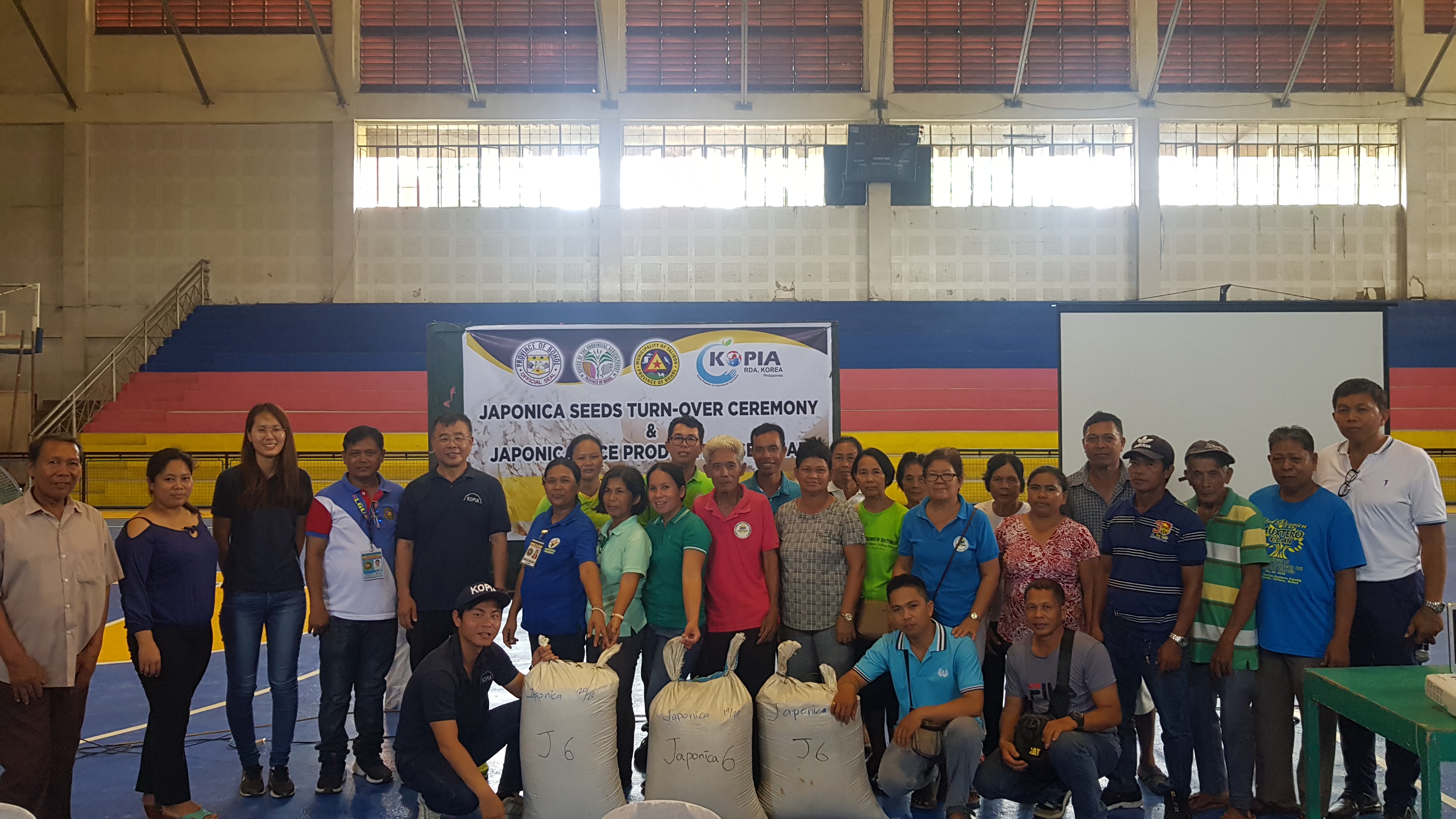Bayanihan Coop gets Japonica rice seeds

To cater to the needs of tourists and for Boholano farmers to earn more, a close collaboration is made to increase the yield and production areas of Japonica rice in Bohol.
At the helm of the joint effort is the Provincial Government of Bohol (PGBh) through the Office of the Provincial Agriculturist (OPA) and the Korea Program on International Agriculture (KOPIA) with the strong partnership of the Municipal Local Government Units (MLGUs) and the farmers associations.
The Korean Government has introduced in the Philippines the seven varieties of Japonica rice namely: MS11, Japonica rice 1-6 which are favorites by the tourists especially coming from Asian countries.
Last Thursday, the OPA, KOPIA and MLGU Talibon turned over some 20 bags of Japonica 6 rice to officers and members of the Bohol Bayanihan Multi-Purpose Cooperative through their president Bonifacio Bermoy during the Japonica Seeds Turnover Ceremony and Japonica Rice Production Training held at the Talibon Gymnasium, Talibon, Bohol.
The seeds came from the PGBh and KOPIA Seed Multiplication of Japonica rice in Ubay.
Dr. Woon Goo Ha, Country Director, KOPIA Philippines in the ceremony explained that the seeds should be propagated and distributed to other farmers to expand the planting areas of Japonica rice in Bohol.
Dr. Ha said that Japonica 6 is the suitable variety especially in the second district of the province.
He shared to the Bayanihan Coop officers and members the technology to grow and produce high yield of Japonica.
The KOPIA Country director said the Japonica rice variety has the same characteristics with Hybrid Rice to thrive in the watery land condition or in the irrigated areas.
In terms of fertilizer application, Japonica rice has thesame procedure with Indica rice. Fertilizers are applied before and after planting.
Angelito B. Oroyan, Municipal Agriculturist, Talibon in his message of support said that the LGU Talibon and his office have been very supportive in this endeavor.
In fact he said that in the town of Talibon there were 20 hectares of paddy fields were planted with Japonica last harvest season.
The national awardee Municipal Agriculturist in Talibon urged the Bohol Bayanihan Multi-Purpose Cooperative to strongly engage in the Japonica rice industry to earn big income. Japonica rice has high demands at high price.
Oroyan bared that he earned knowledge on how to grow Japonica through research here and in South Korea and with that the farmers could also refer to him on problems in growing such variety.
In the meantime, Bermoy, leading more than 5,000 members thanked the PGBh, KOPIA and MLGU Talibon for the introduction and turnover of Japonica rice seeds.
He said the 25-year old cooperative with members from Talibon, Trinidad, Getafe, Ubay and Bien Unido would directly benefit from the endeavor.
Bermoy thanked the OPA, KOPIA and the MLGU Talibon for choosing them as the beneficiary of the project.
He said the Cooperative now is tasked to manage the Rice Processing Center (RPC) 2 situated in San Roque, Talibon which is slated to be inaugurated in August.
Bermoy in advance asked the PGBh through OPA to help them seek prospective markets of the milled rice. Investment on palay is ear marked at P2 million once the RPC 2 will be in operation. (AtoyCosap)
CAPTION:
 |
 |
|---|
JAPONICA RICE SEEDS TURNOVER. Dr. Woon Goo Ha (left), Country Director, KOPIA Philippines and Angelito B. Oroyan (right), Municipal Agriculturist, Talibon underscore the importance of engaging farming on Japonica rice, while the officers of Bohol Bayanihan Multi-Purpose Cooperative are grateful to the PGBh, KOPIA and MLGU Talibon after handed over with sacks of Japonica rice seeds. Photo LEZYL DIEZ, OPA STAFF